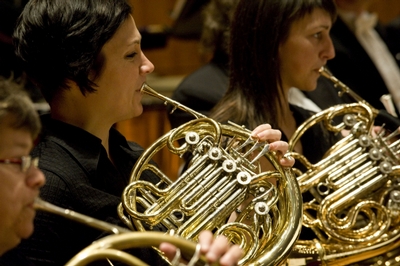
How often does Verdi’s Requiem get performed in the Washington area? At least once a year seems a reasonable guess, and it's generally true, but this season will see even more performances than that. In fact, the Baltimore Symphony Orchestra’s season-ending performance of the work, heard on Saturday night at Strathmore, is the third in less than three weeks, following those by the Prince George’s Philharmonic (May 14) and the National Philharmonic (May 21). Marin Alsop’s blockbuster debut season with the BSO, in 2007-08, seemed to have inaugurated a daring new period for the ensemble—the first “major” American orchestra to be led by a woman as music director. Whatever the reason, Alsop’s programming in subsequent seasons has not been nearly as exciting, and the season past was no different, with a few exceptions. Alsop’s focus on contemporary music, especially by American composers, has continued, albeit with works that it is hard to describe as great. So this performance of the biggest choral chestnut of them all seemed par for the course.
Alsop had an outstanding soprano soloist in Angela Meade, who was frankly the only reason that I wanted to hear another Requiem. The reviews of Meade did not exaggerate: She has a tremendously powerful and flexible dramatic voice, and she blew the rest of the quartet out of the water in terms of both power and subtlety. Even at the loudest parts of the score, with the entire BSO at full bore, Meade’s voice sailed clearly over the fray, while she also had suave control of her voice at soft dynamics, shimmering in the stratosphere in the “Lacrymosa” movement. What Verdi does to the soprano in the closing “Libera me” is sadistic, calling for a high B-flat at pppp. It is unfair to judge an entire performance on the basis of one note, but the sound of that note can make or break the piece. Meade got it and held it, perhaps a little tenuous, the only minor quibble about an otherwise stellar performance. To be fair, this was her third-straight evening singing this very demanding piece.
Of the other three soloists, mezzo-soprano Eve Gigliotti was the best, with a robust, smooth voice that would have been even better if she had been able to follow Alsop’s beat more of the time. Bass Alfred Walker had a nasally snarl and a perpetual scowl: One wished for a different tone color, any different tone color, at times, like maybe some warmth on the more affecting lines of the “Confutatis” movement. Tenor Richard Clement, a late-in-the-game substitution, just did not have the solidity and beauty of the upper range needed for the part.
The Washington Chorus was at its best in the loud, roiling parts of the score like the “Dies irae” refrain: This music is the reason why the Requiem is performed so often, and it rarely fails to thrill, as it did here with the BSO firing on all cylinders. The brass players positioned at the four corners of the auditorium were crisp and coordinated as they provided the sound of the last trumpet of the Apocalypse. Unfortunately, too much of Alsop’s reading of the piece was foursquare and uninspired, which only underscores the clichés of the less glamorous parts of this score: the insipid dance of the “Sanctus,” the dull straightforwardness of the “Agnus dei,” the awkwardness of the closing fugue. Not a performance for the ages.
2011-12 BSO Season
Does the BSO’s next season promise anything new for listeners, or will it be more of the same? Perhaps the orchestra’s continuing financial precariousness, only worsened by the collapse of the world’s financial markets, has caused Alsop to scale back on her normally intrepid nature. Perhaps it is because she continues to be busy with lots of other side projects, too —most recently adding work as principal conductor of the Orquestra Sinfônica do Estado de São Paulo. Certainly, any concert offered up by Alsop and the BSO will be pleasant enough listening, but is there anything that will be regrettable to miss?
In that category we would put only a few concerts, beginning with Yan Pascal Tortelier conducting Sibelius’s Fifth Symphony and Elgar’s In the South (October 1 and 2), plus Alsop conducting Shostakovich’s Seventh Symphony (“Leningrad,” May 3 to 6) and Elgar’s First Symphony (May 10 to 13). The highlight of the season, as far as unusual repertory, will be the two programs celebrating Joan of Arc, who was born (presumably) 600 years ago next year: Arthur Honegger’s dramatic oratorio Joan of Arc at the Stake (November 17 and 18) and Richard Einhorn’s Voices of Light, a score meant to accompany Carl Theodor Dreyer’s silent film The Passion of Joan of Arc (March 2 to 4). The other noteworthy concerts feature guest conductors: baroque music for trumpet with Nicholas McGegan (February 2 and 4), a Czech program with Jiri Belohlavek (March 16 to 18), and possibly Beethoven’s Ninth with Mario Venzago (May 24 to 26), whose appearance with the BSO was one of the highlights this past season.
The rest of the season will feature some highly regarded soloists playing lots of war horses, a trend announced right from the start, in the BSO’s Gala Concert to open the season, with Hilary Hahn as its centerpiece, playing Mendelssohn’s violin concerto (September 10). The parade of stars continues with Alisa Weilerstein (Dvorak’s cello concerto, September 23 to 25), James Ehnes (a Mozart violin concerto, October 20 to 22), Barry Douglas (Liszt’s First Piano Concerto, October 28 to 30), Itzhak Perlman (Vivaldi, January 12 to 15), Olga Kern (Tchaikovsky’s First Piano Concerto, January 19 to 22), Lise de la Salle (a Mozart piano concerto, February 16 and 17), Colin Currie (Jennifer Higdon’s Percussion Concerto, March 22 to 24), Arabella Steinbacher (the Beethoven Violin Concerto, April 26 to 28), Jonathan Biss (Beethoven’s Third Piano Concerto, May 31 to June 2), and Nadja Salerno-Sonnenberg (Tchaikovsky’s Violin Concerto, June 7 to 10).
Other less remarkable events include yet another performance of Mahler’s Second Symphony (September 15 to 17), a program of Copland and Gershwin greatest hits (November 10 to 13), and a repeat of Philip Glass’s Life: A Journey Through Time (January 27 to 29), heard in 2007, this time paired with Beethoven’s Sixth Symphony. None of these concerts will be unpleasant, to be sure, as the BSO continues to play at a high level of musicality. All together, however, it adds up to another somewhat ho-hu
m season from Marin Alsop.
Subscribe to Washingtonian
Follow Washingtonian on Twitter
More>> After Hours Blog | Arts & Events | Happy Hour Finder | Calendar of Events















